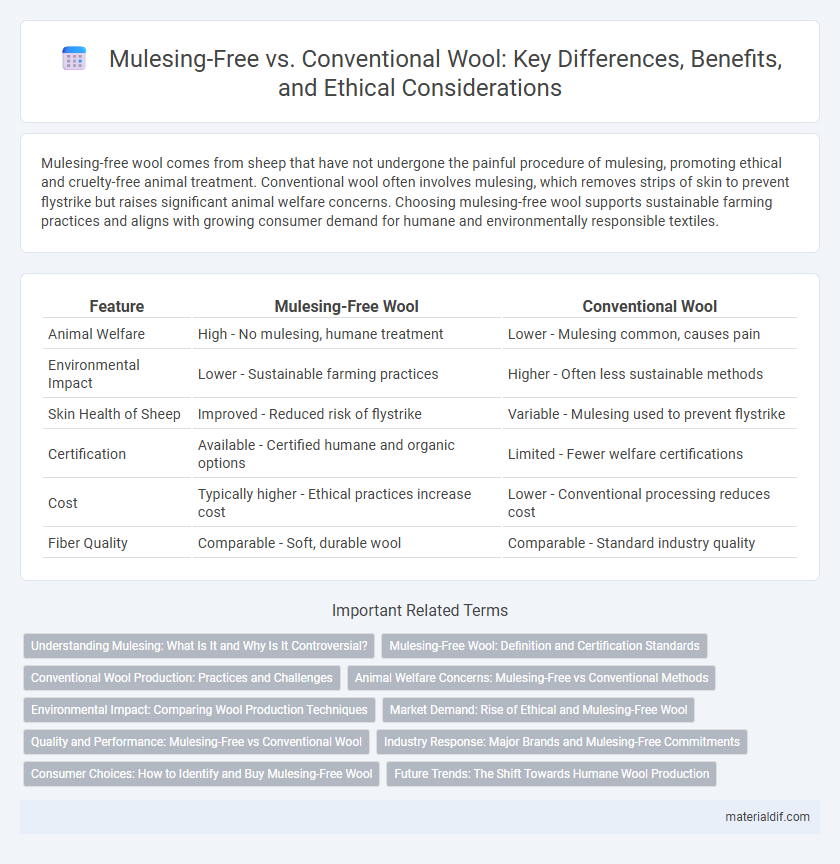Mulesing-free wool comes from sheep that have not undergone the painful procedure of mulesing, promoting ethical and cruelty-free animal treatment. Conventional wool often involves mulesing, which removes strips of skin to prevent flystrike but raises significant animal welfare concerns. Choosing mulesing-free wool supports sustainable farming practices and aligns with growing consumer demand for humane and environmentally responsible textiles.
Table of Comparison
| Feature | Mulesing-Free Wool | Conventional Wool |
|---|---|---|
| Animal Welfare | High - No mulesing, humane treatment | Lower - Mulesing common, causes pain |
| Environmental Impact | Lower - Sustainable farming practices | Higher - Often less sustainable methods |
| Skin Health of Sheep | Improved - Reduced risk of flystrike | Variable - Mulesing used to prevent flystrike |
| Certification | Available - Certified humane and organic options | Limited - Fewer welfare certifications |
| Cost | Typically higher - Ethical practices increase cost | Lower - Conventional processing reduces cost |
| Fiber Quality | Comparable - Soft, durable wool | Comparable - Standard industry quality |
Understanding Mulesing: What Is It and Why Is It Controversial?
Mulesing involves surgically removing strips of sheep skin around the tail to prevent flystrike, a parasitic infection caused by blowflies laying eggs in damp wool. Conventional wool often comes from sheep that have undergone mulesing, sparking ethical concerns due to animal welfare implications and pain caused without anesthesia. Mulesing-free wool is gaining demand as it promotes humane practices by using alternative flystrike prevention methods, appealing to consumers seeking cruelty-free and sustainable textile options.
Mulesing-Free Wool: Definition and Certification Standards
Mulesing-free wool refers to fleece sourced from sheep that have not undergone the painful surgical procedure known as mulesing, aimed at preventing flystrike. Certification standards for mulesing-free wool, such as those established by the Responsible Wool Standard (RWS) and ZQ Merino, ensure animal welfare by verifying that sheep are managed ethically without mulesing practices. These certifications promote sustainable and cruelty-free wool production, addressing consumer demand for high-quality, ethical textiles.
Conventional Wool Production: Practices and Challenges
Conventional wool production often involves mulesing, a practice used to prevent flystrike by removing strips of skin from lambs, which raises significant animal welfare concerns. This method supports high-quality fleece growth but faces increasing scrutiny and regulatory restrictions due to its ethical implications. Producers encounter challenges in balancing wool yield, animal health, and market demand for more humane alternatives.
Animal Welfare Concerns: Mulesing-Free vs Conventional Methods
Mulesing-free wool prioritizes animal welfare by eliminating the painful removal of skin around a sheep's breech area, which is common in conventional methods to prevent flystrike. This humane approach relies on alternative strategies such as breeding for wrinkle-free sheep and enhanced pest management, reducing stress and injury. Consumers increasingly favor mulesing-free products due to growing awareness of ethical treatment and sustainable farming practices.
Environmental Impact: Comparing Wool Production Techniques
Mulesing-free wool production reduces animal suffering by avoiding the surgical removal of skin, promoting ethical farming practices that enhance sustainability. Conventional wool often involves mulesing, which can lead to environmental degradation through increased chemical use for flystrike prevention and potential soil erosion from stressed sheep. Mulesing-free methods emphasize holistic pasture management and organic treatments, resulting in lower environmental impact and better biodiversity conservation in sheep farming.
Market Demand: Rise of Ethical and Mulesing-Free Wool
Market demand for mulesing-free wool is rapidly increasing as consumers prioritize ethical sourcing and animal welfare, driving brands to shift away from conventional wool produced through mulesing practices. Retailers and textile companies are responding by sourcing certified mulesing-free wool, ensuring transparency and sustainability in their supply chains. This ethical shift is expanding market opportunities and influencing global wool production standards.
Quality and Performance: Mulesing-Free vs Conventional Wool
Mulesing-free wool maintains high quality by ensuring the fleece is free from mulesing scars, resulting in smoother fibers and improved comfort for end-users. Conventional wool, while often perceived as slightly more durable due to traditional flock health management, can suffer from fiber damage and reduced softness caused by mulesing-associated skin stress. Performance in garments favors mulesing-free wool for its ethical production and superior softness, making it suitable for sensitive skin and premium textile applications.
Industry Response: Major Brands and Mulesing-Free Commitments
Leading fashion brands such as Patagonia, The North Face, and Icebreaker have publicly committed to sourcing 100% mulesing-free wool by 2025, reflecting a growing industry shift towards ethical wool production. Retailers and manufacturers are increasingly partnering with certified mulesing-free wool suppliers, enhancing transparency through traceability systems and third-party audits. This commitment not only addresses animal welfare concerns but also aligns with consumer demand for sustainable and cruelty-free apparel.
Consumer Choices: How to Identify and Buy Mulesing-Free Wool
Consumers seeking mulesing-free wool should look for certifications such as ZQ Merino, Responsible Wool Standard (RWS), or PETA-approved labels that ensure ethical sheep treatment without mulesing. Retailers specializing in sustainable fashion often clearly mark their products as mulesing-free, offering transparency and traceability via QR codes or detailed product descriptions. Awareness of these labels enables consumers to make informed purchasing decisions, supporting animal welfare and sustainable wool production.
Future Trends: The Shift Towards Humane Wool Production
Mulesing-free wool production is gaining momentum as consumer demand for ethical and sustainable textiles increases, prompting major brands to adopt cruelty-free sourcing policies. Innovations in breeding and pest control techniques reduce reliance on mulesing, enhancing animal welfare without compromising wool quality. Industry-wide transparency frameworks and certifications drive accountability, positioning humane wool production as the future standard in global wool markets.
Mulesing-Free vs Conventional Wool Infographic

 materialdif.com
materialdif.com